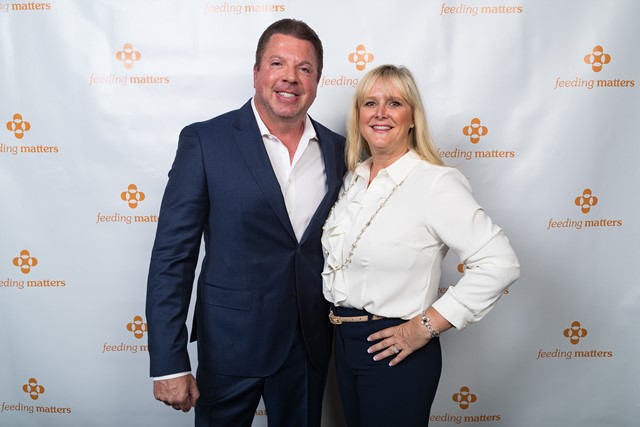
A pediatric feeding disorder can be described as a child or infant with a severe disruption in feeding. They're not “picky eaters” or “growing out of a phase”; eating is seen as a negative activity and their body resists it completely. Medical issues (there 300 medical conditions that put children at a higher risk) related to pediatric feeding disorders include food allergies, autism, general heart defects and, in most cases, are babies who are born prematurely—which was the case with the triplets of Feeding Matters’ founder, Shannon Goldwater (pictured), and the daughter of CEO and president of the organization, Chris Linn.
A pediatric feeding disorder is also something that is not commonly diagnosed or even recognized by many healthcare professionals. Linn says Feeding Matters is “trying to be that conduit of information and help with providing information to healthcare providers since it’s not something in their school curriculum.” One of the main goals for Feeding Matters, which was founded locally in 2006, is to make pediatric feeding disorders a standalone diagnosis in the healthcare profession. Currently, the organization is awaiting word if its consensus paper will be endorsed by the American Academy of Pediatrics while pursuing publication in the Journal of Pediatrics.
While Feeding Matters is trying very hard to bring awareness to many healthcare professionals, it is also a huge support for the many families who have children suffering from a feeding disorder. The organization also offers a “power of two” program that matches a family who’s navigated a pediatric feeding disorder to a family which is just starting their journey, offering support and guidance through the grueling process. Linn says new parents can “feel alone, isolated and scared and [parents who have already been through this can] give them ideas and empower them to feel confident, which is at the heart of what we do.”
The organization also has an infant and child feeding questionnaire on its Web site, along with many resources and information, that can give parents a summary of red flags that may lead to a feeding problem. Linn says parents can “print or e-mail the results to show physicians, [which in turn will] spark a better dialogue of what’s happening, instead of the poor parent trying to articulate what’s going on.”
In 2016, Feeding Matters reached more than 65,000 parents and medical professionals from around the United States and 12 other countries making it known that pediatric feeding disorders is a global issue with “Feeding Matters being the only organization in the world focusing on this particular issue of furthering the advances.”
To Learn More
Feeding Matters feedingmatters.org.
